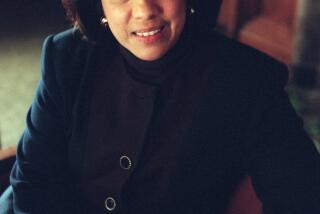Her Fight for Justice Continues
Rigoberta Menchu Tum stood before a small group of supporters Sunday afternoon in Santa Ana and slowly pulled the microphone down to reach her less-than-5-foot frame.
“I was born a little short,” said Menchu Tum, the youngest person to be awarded the Nobel Peace Prize. The audience chuckled at her first words, and that was all it took for her to warm the room.
It is her simple and candid--yet effective--style that many say has helped this Guatemala native highlight human rights violations among indigenous peoples and help bring an end to a 30-year-old civil war in Guatemala.
“She reminds me of Mother Earth,” said Enriqueta Ramos, one of about 20 people who attended Menchu Tum’s appearance sponsored by Santa Ana College. “When I get close to her . . . there is a power. It comes from within.”
Ramos, a member of the Rancho Santiago Community College District board, said she feels a kinship and respect for Menchu Tum, who has overcome vast odds to reach her position.
“She put a very strong light [on Guatemala] and said, ‘Look, this is what is happening to these people. We are going to do something about it.’ ”
In 1992, at age 33, Menchu Tum, a Mayan, was the youngest person to receive the Nobel Peace Prize. The Nobel Committee called her “a vivid symbol of peace and reconciliation across ethnic cultural and social dividing lines, in her own country, on the American continent and in the world.”
Her father, mother and brother were killed by the Guatemalan government in separate incidents.
Today, Menchu Tum continues to fight for peace. Several peace accords have been signed in Guatemala, putting an end to armed, internal conflict. She said there are still numerous examples of abuse and civil rights violations: judges who can be bought, and police reports or evidence that are inexplicably “lost.”
Her foundation, which she started after receiving the Nobel, advocates for improved education, health care and human rights for indigenous people. She also collaborates on an international level with other Nobel laureates to promote world peace.
She was in Santa Ana on Sunday as part of a fund-raising swing through Southern California and visits to several colleges and universities.
“We shall always move forward and never let history turn back to the past,” she said through an interpreter.
Menchu Tum said that although she is pleased with the progress she has made over the years, “it’s never enough.”
Change does not come from one person’s work but through broad-based efforts, she said. “It depends on people struggling for their rights,” she said.
More to Read
Sign up for Essential California
The most important California stories and recommendations in your inbox every morning.
You may occasionally receive promotional content from the Los Angeles Times.











